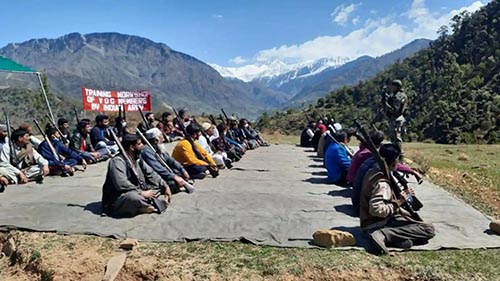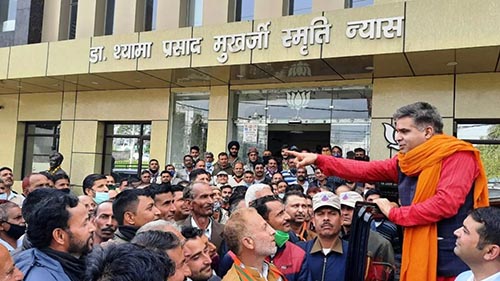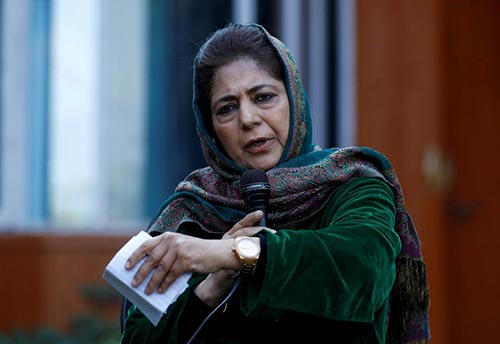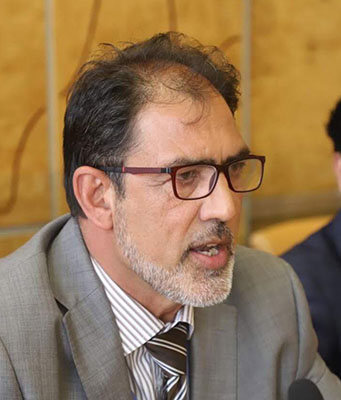The Indian government has recently announced its decision to revive the dreaded ‘Village Defence Committees’ (VDCs) in the occupied territory of Jammu and Kashmir. The widely criticized move has been initiated under the pretext of strengthening the so-called security grid in this Muslim-majority region, though it runs counter to the much-hyped Indian narrative of normality in Kashmir. The track record of members of VDCs, which include a diverse array of irregular forces ranging from renegade militant groups to criminal gangs, highlights the dangerous nexus between the Indian Army, the ruling Bharatiya Janata Party (BJP), and predominantly Hindu vigilante groups that have unleashed havoc by targeting marginalised communities, particularly the Muslims in communally sensitive areas of the region.
The successive Indian governments have repeatedly recruited these informal militia groups in Kashmir as proxies to counter the resistance movement, resorting to massive human rights abuses. Instead of working to address the political aspirations of the people of the region, New Delhi has time and again resorted to illegal measures that have had adverse impacts on civilians.

The intensity and ferocity of the VDC members over the years can be gauged by the fact that hundreds of cases relating to their direct involvement in crimes, including murder, rape, plundering and rioting, remain pending in the courts across the disputed region. Official estimates show that 221 cases have been filed against various VDC members over their involvement in such serious crimes. Amongst these, 23 VDC members have been charged with murder, and seven with rape. However, the conviction rate in the cases against VDCs is low, with only six cases having so far led to a conviction. For rights activists, the Indian government’s plans to revive these treacherous VDCs is alarming and does not augur well for the future of the region and the safety of its communities.
Use of Mercenaries
The systematic use of irregular militias in Kashmir began in 1995 when the Special Task Force (STF) was formed by recruiting mercenaries to neutralise the resistance struggle in the Kashmir valley. Captured and surrendered militants were redeployed as “counter-insurgents” or “friendlies.” Mohammad Yusuf Parray, alias Kuka Parray, Papa Kistawari, Ghulam Mohammad Mir alias Mum Kana, Javed Shah, and Liaquat Khan were among the renegade militants, who were aided and abetted by the government to fight alongside the military and paramilitary forces.
Kuka Paray led his group, Ikhwan-ul-Muslimeen. Other groups were operated by Javed Ahmad Shah, who had the backing of the State Police’s Special Operations Group, while Liaquat Khan operated in Anantnag district. By late 1994 all the three groups had merged into one entity known as Ikhwan-ul-Muslimeen. Between 350 and 500 members of Ikhwan remained on active duty. They were controlled primarily by the Indian Army, but also worked with police and paramilitary personnel.

These renegade groups, viewed in Kashmir as criminal gangs, remained active in the region for several years. Between 1996 and 1998, these mercenaries indulged wantonly and indiscriminately in gross violations of human rights, while the Indian military establishment shielded them with impunity. Even innocent women and children weren’t spared by these mercenaries. The innumerable human rights violations committed by these groups are widely corroborated by independent observers.
With weapons supplied by the Indian government, these groups ran a parallel administration in the mid-1990s. Decried by the Kashmiris as traitors, these groups also carried out summary executions as they tortured and illegally detained scores of innocent Kashmiris. During elections, their activities intensified as they threatened and intimidated voters. At the same time, Special Operation Groups (SOGs) were created to unleash terror on common people in Kashmir.
Rather than holding mercenaries accountable for their crimes, including extortion and outright cases of loot and plunder, the Indian government offered them seats in the state assembly and also conferred gallantry awards upon them. The height of the government’s hypocrisy came in 2010 when one of these most feared and violent renegades, Ghulam Mohammed Mir, alias Muma Kana, was awarded the Padma Shri for his appalling role in suppressing the freedom movement.
The Village Defence Committees in Jammu and Kashmir were originally established in 1995, initially in Doda District, but within no time they mushroomed from 400 units to over 1,600 units. Initially, there were around 5,000 VDC members, but over the years their number has grown to over 27,000. Mostly Hindus influenced by the RSS ideology were recruited into the militia as part of the government’s policy to keep a strict vigil on the activities of the Muslims in the region.
Working beyond the purview of the law, members of the State-backed militia soon turned into an unbridled band of thugs, who not only started to settle their personal scores but also involved themselves in massive human rights abuses and other anti-social activities. The VDCs, being largely composed of Hindus, have thus created an undercurrent of communal tension, especially in the villages with a mixed population.
Unsurprisingly, there has been a persistent demand by local Muslim leaders to disarm the VDCs as weapons and ammunition allotted to them have been used in communal clashes which often broke out whenever there were targeted killings. According to reports, FIRs against 200 VDC members for committing crimes of a serious nature have been registered in different police stations of Doda, Samba, Udhampur and other Districts.
Over time these committees have mostly been absorbed into the armed wings of the BJP-RSS Brigade. The BJP government’s decision to revive them under a new name is tantamount to pitting Hindus against Muslims, particularly in communally sensitive areas of Kishtwar, Doda and Ramban.
Already occupied by 800,000 troops, the contentious decision to revive the dreaded militia is bound to push occupied Kashmir further into a quagmire of uncertainty and lawlessness. The move, fraught with serious political ramifications, is doomed to destroy communal harmony, polarise the social fabric, and widen the inter-religious and ethnic divide.
The news of VDCs being revived has already deepened the communal strife in the region, with Hindus applauding the decision, while Muslims are opposing it. The Kashmiri leadership across the political spectrum has continuously voiced grave concern over the move.
Along with the socio-political leadership of Kashmir, many civil society members and human rights groups, including Jammu and Kashmir Coalition of Civil Society (JKCCS), have in the past opposed the creation of VDCs.
Political Parties’ Outrage
The Kashmiri political parties have strongly objected to the constitution of VDC’s in the occupied territory, saying that arming people without any set mechanism of accountability will lead to anarchy. Spokesperson of the National Conference Imran Nabi Dar, while reacting to the development, said that the government’s words don’t match its actions. “Not so long ago, the government was saying everything is hunky-dory in J&K.” The decision, he said, puts a big question mark on the claims of the Indian government.
Former Chief Minister and President Peoples Democratic Party (PDP), Mehbooba Mufti, in a tweet said; “The move of the Ministry of Home Affairs to form Village Defence Committees across the territory is another addition to a slew of decisions that contradict Indian government’s much touted normalcy claims. Clearly Kashmir is far from any semblance of normalcy,” she said, adding, “It will also create a wedge between communities.”

The All Parties Hurriyat Conference (APHC) leader, Nayeem Ahmed Khan, also voiced his grave concern over the move saying that the decision to revive VDCs under a new name was part of the BJP Government’s divisive agenda aimed at pitting one community against the other. He said that the decision was bound to drive a wedge between the communities as the VDC members have been found grossly involved in human rights abuses, victimisation and initiating communal violence, especially in the Hindu-dominated areas of Jammu.
Indian forces operating in Kashmir have been working closely with these VDCs. Rather than disbanding these criminal gangs, the Modi government is now providing them with more weapons, training and other incentives.
The decision is being taken at a time when the Hindu nationalist leaders are openly calling for a Muslim genocide in Kashmir, after watching Bollywood’s highly controversial, propaganda laden film, The Kashmir Files, which portrays Kashmiris as terrorists. The film, being screened for free in many Indian cities, fosters Islamophobia and anti-Muslim hatred. The RSS and BJP is promoting the film with a view to advance their ultra-nationalist agenda, which paints Islam and Muslims to be a threat to the country’s Hindu majority.
Amidst mounting majoritarianism and polarisation in India, the so-called Kashmir Files is an incendiary recipe to legitimise the persecution of innocent Kashmiri Muslims at the hands of the Indian occupation troops.
Mercenaries as Quick Fix
The government of India’s constant deployment of gangs of armed mercenaries as a quick fix to control Kashmiris, indicates its utter disregard for the international law that strongly prohibits the formation of armed bands of irregulars. No law provides legal authority to a State for organising and arming people without any proper mechanism of accountability, especially when there is little or no recourse to justice for victims.
International law prohibits the use of mercenaries in armed conflict and certain peaceful situations. On the other hand, the Geneva Conventions declare that mercenaries are not recognised as legitimate combatants and do not have to be granted the same legal protections as captured service personnel of a regular army. The United Nations also considers use of mercenaries as illegal under international law.
Since the government of India has escalated its programme of recruitment, training and arming of these controversial committees as part of its policy to suppress the Kashmiris’ legitimate political struggle, it is imperative that the international community should take serious notice and demand that these irregular armed groups should be disbanded, and hold accountable all those individuals implicated in criminal offenses. The Indian government should be asked to fulfil its obligations under the law and ensure that all allegations of abuses by VDC members, including illegal detention of civilians, torture, rape, and extortion, are thoroughly investigated.

The writer is Chairman, Kashmir Institute of International Relations (KIIR), Islamabad. He is a member of the All Parties Hurriyat Conference, AJK chapter.



